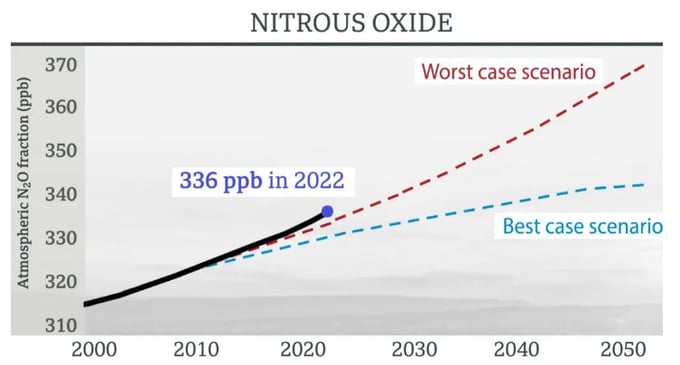May 19, 2025 | 21:12 GMT +7
May 19, 2025 | 21:12 GMT +7
Hotline: 0913.378.918
May 19, 2025 | 21:12 GMT +7
Hotline: 0913.378.918

Dr Wilson's research has found nitrous oxide levels are rising faster than predicted.
Angus Gowthorpe introduced the process of regenerative agriculture at his farm in Riccall, North Yorkshire, 11 years ago to address the declining health of his soil.
Research published earlier this year found levels of the greenhouse gas nitrous oxide, which is released from fertilisers, were rising faster than those predicted in a worst-case scenario.
Mr Gowthorpe said his crops were "so much healthier by having a healthier soil".
Instead of ploughing the land on his 450-acre farm, Mr Gowthorpe now drills the next crop into the residue of the previous one.
By doing so, the carbon dioxide in the soil which would normally be released during the ploughing process does not get into the atmosphere.
He said: "Our yields have been maintained, but our costs are significantly down and the amount of plant-protection products or sprays that we are using is significantly down, as well as the nitrogen being down, because the plants are so much healthier by having a healthier soil."
According to the International Institute for Sustainable Development, "a significant part of the food that we produce and consume depends on the use of synthetic fertilizers".
However, Dr Chris Wilson from the School of Earth and Environment at the University of Leeds said concentrations of nitrous oxide in the atmosphere would "continue to rise at alarming rates" unless there was "more considered" use of fertilisers.
"It has the potential to be very damaging," he said.
"It sticks around in the atmosphere for over 100 years and it has strong global warming potential in comparison to CO2."
Dr Wilson, whose research found nitrous oxide levels in the atmosphere were rising faster than predicted, said the greenhouse gas had contributed about 10% of human impact on climate change.
(BBC)

(VAN) As a doctoral student doing research on renewable energy and electrification at Harvard University, the author shares his musings on electricity, nature, and countryside memories.

(VAN) The decree on Extended Producer Responsibility (EPR) ensures transparent management and disbursement of support funds, avoiding the creation of a “give-and-take” mechanism.

(VAN) Hue City rigorously enforces regulations regarding marine fishing and resource exploitation, with a particular emphasis on the monitoring of fishing vessels to prevent illegal, unreported, and unregulated (IUU) fishing.

(VAN) Hanoi People's Committee has issued a plan on reducing greenhouse gas emissions in the waste management sector with 2030 vision.

(VAN) Vietnam's draft amendment to Decree No. 156 proposes a mechanism for medicinal herb farming under forest canopies, linking economic development to population retention and the sustainable protection and development of forests.

(VAN) In reality, many craft village models combined with tourism in Son La have proven effective, bringing significant economic benefits to rural communities.

(VAN) The international conference titled Carbon Market: International experiences and recommendations for Vietnam was successfully held recently in Ho Chi Minh City.